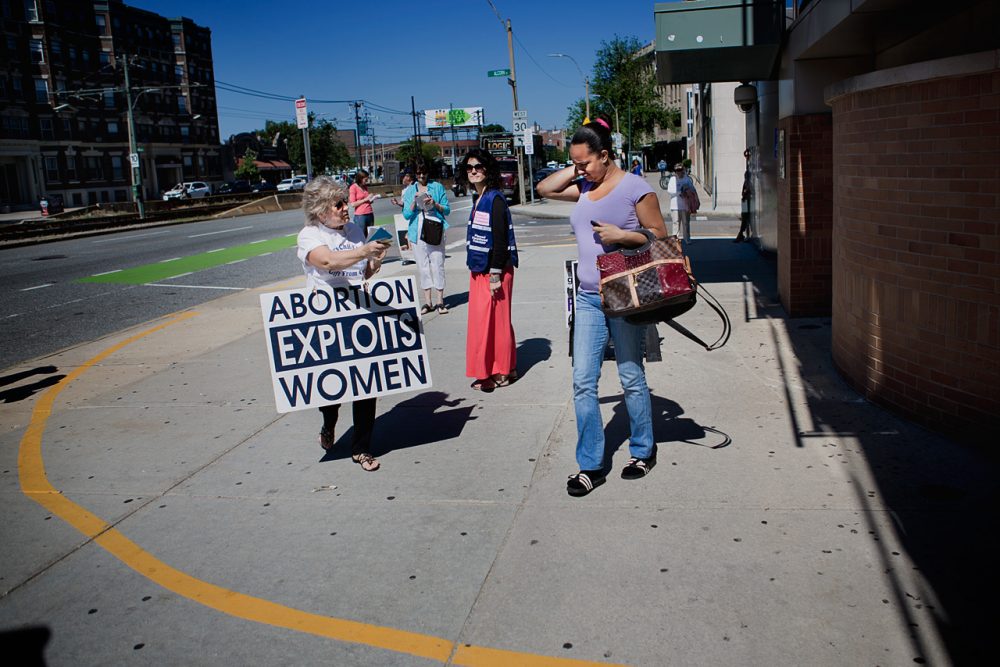Advertisement
Bill Filed To Strengthen Abortion Clinic Safety

Police would be allowed to disperse groups substantially impeding access to Massachusetts abortion clinics under a bill filed Monday in response to the Supreme Court decision striking down the state's buffer zone law.

After a dispersal order is issued, individuals would have to remain at least 25 feet from the clinic's entrances and driveways for a maximum of eight hours. A dispersal area would have to be clearly marked and the dispersal law posted.
The bill would also prohibit any physical act or threat of force from being used to intimidate anyone trying to enter or leave a clinic. It would also prohibit anyone from knowingly impeding an individual or vehicle's access to a facility.
The bill is a response to the high court's decision last month to toss out a state law that established 35-foot protest-free "buffer zones" around the entrances of abortion clinics.
Massachusetts Citizens for Life President Anne Fox cautioned lawmakers from overreaching as they craft a response to the court's unanimous ruling on the buffer zone law. The group opposes abortion.
Fox said no new laws are needed.
"There are already laws against blocking driveways or entrances. There are laws against harassment, and injunctions are available against persons who violate existing laws," Fox said in a statement released before the bill was filed. "Let's not waste the time of the legislators and the tax money of the citizens to end up before the Supreme Court again."
Gov. Deval Patrick said the legislation is about guaranteeing safe access to the clinics.
"Here in Massachusetts we know all too well why we must ensure that women and men seeking access to reproductive health facilities can do so safely," Patrick said in a statement. "This bill protects those patients, and the employees providing their care."
Advertisement
Senate President Therese Murray and House Speaker Robert DeLeo, both Democrats, said they are planning to get a bill to Patrick's desk before the end of the Legislature's formal session on July 31.
The bill would also create civil remedies by allowing anyone who believes they are a victim under the new law to file a civil action in Superior Court seeking injunctive relief, damages, and attorneys' fees. Any violation of an injunction would constitute a criminal offense.
Supporters say that portion of the bill largely mirror civil remedies allowed under the federal Freedom of Access to Clinic Entrances Act.
The legislation would also amend the state's existing Massachusetts Civil Rights Act to allow the attorney general to seek damages on behalf of affected individuals who have been blocked from clinics. The attorney general would also be able to recover litigation costs and seek civil penalties for the interference of constitutional rights.
Attorney General Martha Coakley called the bill "the best solution to protect those patients and employees" considering the Supreme Court's decision.
"Women must be able to access reproductive health care free from intimidation and threats," said Coakley, who is also a Democratic candidate for governor.
More Coverage:
- Listen: New Bill Seeks To Strike Balance Between Safety, Free Speech Rights At Abortion Clinics
- 7/9/14: Abortion Rights Advocates Call For Legislation To Enhance Safety Outside Clinics
- 7/8/14:Group Urges Caution On New Mass. Buffer Zone Bill
- 6/27/14:A Day After Buffer Zone Ruling, Anti-Abortion Advocates Are Inside Boston Clinic’s Yellow Line
- 6/26/14:Supreme Court Voids Mass. Abortion Clinic Buffer Zone Law
This article was originally published on July 14, 2014.